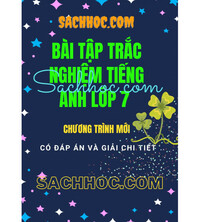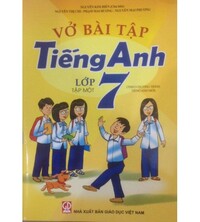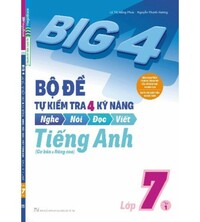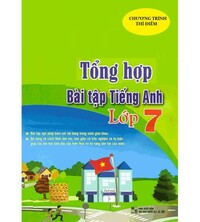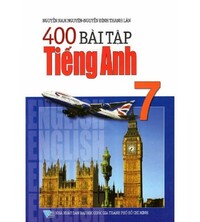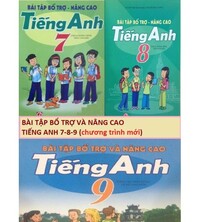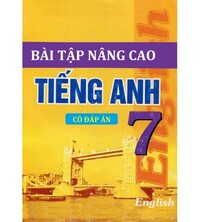Test Yourself 3 - trang 27 SBT Tiếng anh 7 mới
Find the word which has a different sound in the part underlined.
Bài 1
- 1. Find the word which has a different sound in the part underlined.
(Tìm từ có phần gạch chân phát âm khác các từ còn lại)
1. A.played
B.travelled
C.planned
D.watched
Lời giải:
Played /pleɪd/
Travelled /ˈtrævld/
planned /plænd/
watched /wɒtʃt/
Đáp án D phát âm là /t/, còn lại là /d/
Đáp án: D
2. A.buffalo
B.unhappy
C.pollution
D.structure
Lời giải:
Buffalo /ˈbʌfələʊ/
Unhappy /ʌnˈhæpi/
Pollution /pəˈluːʃn/
Structure /ˈstrʌktʃə(r)/
Đáp án C phát âm là /ə/, còn lại là /ʌ/
Đáp án: C
3. A.collection
B.comic
C.concert
D.volunteer
Lời giải:
Collection /kəˈlekʃn/
Comic /ˈkɒmɪk/
Concert /ˈkɒnsət/
Volunteer /ˌvɒlənˈtɪə(r)/
Đáp án A phát âm là /ə/, còn lại là /ɒ/
Đáp án: A
4. A.bread
B.really
C.head
D.death
Lời giải:
Bread /bred/
Really /ˈriːəli/
Head /hed/
Death /deθ/
Đáp án B phát âm là /iːə/, còn lại là /e/
Đáp án: B
5. A.walked
B.crowded
C.needed
D.excited
Lời giải:
Walked /wɔːkt/
Crowded /kraʊdɪd/
Needed /niːdɪd/
Excited /ɪkˈsaɪtɪd/
Đáp án A phát âm là /t/, còn lại là /ɪd/
Đáp án: A
Bài 2
- 1. Find the suitable road sign or festival in the box and write it under each picture.
(Tìm biển báo hoặc lễ hội thích hợp trong hộp và điền nó vào dưới mỗi bức tranh)
 |
|
 |
|
 |
|
 |
|
 |
|
 |
|
Câu 3
- 1. Read the following passage and tick (ü) True (T) or False (F) for each sentence.
(Đọc đoạn văn sau và chọn đúng hay sai cho mỗi câu)
The Vietnamese people celebrate the New Year (Tet) on the first three days of the January according to the lunar calendar. To prepare for Tet, these days, they often paint and decorate their houses. They buy a lot of fruit, flowers and make many delicious dishes. They make sticky rice cakes because they are their traditional cakes. People who work a long distance away try to get home on these days. On the first day of Tet, people often offer these good fruit and food to their ancestors and after that the whole families enjoy the food. They also visit pagodas, temples, their relatives and friends. Children are very happy to get lucky money from the adults. There are a lot of traditional games and contests at Tet such as rice-cooking, fight-making, water-fetching, buffalo-fighting, etc. They are really interesting. People are playing and enjoying themselves very much on this occasion.
|
T |
F |
|
|
1.The Vietnamese people celebrate the New Year (Tet) on the first day of the January according to the lunar calendar. |
||
|
2.People often paint and decorate their houses after Tet. |
||
|
3.They buy a lot of fresh fruit, flowers and make many delicious dishes. |
||
|
4.On the first day of Tet, people often offer these good fruit and food to their ancestors. |
||
|
5.Children are given lucky money from the adults. |
Hướng dẫn giải:
1. The Vietnamese people celebrate the New Year (Tet) on the first day of the January according to the lunar calendar. (Người dân Việt Nam đón Tết vào ngày đầu tiên của tháng giêng theo âm lịch)
Thông tin: The Vietnamese people celebrate the New Year (Tet) on the first three days of the January according to the lunar calendar.
Đáp án: F
2. People often paint and decorate their houses after Tet. (Mọi người thường sơn và trang trí nhà cửa sau Tết.)
Thông tin: To prepare for Tet, these days, they often paint and decorate their houses.
Đáp án: F
3. They buy a lot of fresh fruit, flowers and make many delicious dishes (Họ mua rất nhiều trái cây tươi, hoa và làm nhiều món ngon)
Thông tin: They buy a lot of fruit, flowers and make many delicious dishes
Đáp án: T
4. On the first day of Tet, people often offer these good fruit and food to their ancestors.( Vào ngày đầu tiên của Tết, mọi người thường cung cấp những loại trái cây và thực phẩm tốt này cho tổ tiên của họ.)
Thông tin: On the first day of Tet, people often offer these good fruit and food to their ancestors and after that the whole families enjoy the food.
Đáp án: T
5. Children are given lucky money from the adults (Trẻ em được nhận tiền may mắn từ người lớn)
Thông tin: Children are very happy to get lucky money from the adults.
Đáp án: T
Dịch đoạn văn:
Người dân Việt Nam đón Tết Nguyên đán (Tết) vào ba ngày đầu tháng giêng theo âm lịch. Để chuẩn bị cho Tết, những ngày này, họ thường vẽ và trang trí nhà cửa. Họ mua rất nhiều trái cây, hoa và làm nhiều món ngon. Họ làm bánh nếp vì chúng là bánh truyền thống của họ. Những người làm việc ở xa cố gắng về nhà vào những ngày này. Vào ngày đầu tiên của Tết, mọi người thường cung cấp những loại trái cây và thực phẩm tốt này cho tổ tiên của họ và sau đó cả gia đình thưởng thức các món ăn. Họ cũng đến thăm chùa, chùa, người thân và bạn bè của họ. Trẻ em rất hạnh phúc khi nhận được tiền may mắn từ người lớn. Có rất nhiều trò chơi và cuộc thi truyền thống vào dịp Tết như nấu cơm, chiến đấu, lấy nước, đánh trâu, v.v ... Chúng thực sự rất thú vị. Mọi người đang chơi và tận hưởng bản thân rất nhiều trong dịp này.
Bài 4
- 1. Fill each blank with a word from the box.
(Điền vào mỗi chỗ trống một từ từ trong hộp)
|
Disappointing |
Annoying |
Surprising |
Moving |
Satisfied |
Hướng dẫn giải:
Disappointing: thất vọng
Annoying: phiền
Surprising : ngạc nhiên
Moving: cảm động
Satisfied
- We found his behaviour _____________.
Đáp án: annoying
Tạm dịch: Chúng tôi thấy hành vi của anh ta thật khó chịu.
- In spite of his spending millions of dollars on the film, it was ____________.
Đáp án: disappointing
Tạm dịch: Mặc dù anh ấy đã chi hàng triệu đô la cho bộ phim, điều đó thật đáng thất vọng.
- We were all ____________ with the service at this hotel.
Lời giải: (to) be satisfied with …: hài lòng, thỏa mãn
Đáp án: satisfied
Tạm dịch: Chúng tôi đều hài lòng với dịch vụ tại khách sạn này.
- The end of Romeo and Juliet film is quite ____________.
Đáp án: moving
Tạm dịch: Kết thúc của phim Romeo and Juliet khá cảm động
- His new film is really ____________. You should see it.
Đáp án: surprising
Tạm dịch: Bộ phim mới của anh ấy thực sự đáng ngạc nhiên. Bạn nên xem nó
Bài 5
- 1. Put a word in each gap in the following dialogue, then practise it with a partner.
(Điền một từ vào mỗi chỗ trống trong đoạn hội thoại sai, sao đó luyện tập nó với một người bạn)
Teacher: There are a lot of festivals around the world. Which festival do you like, Nick?
Nick: I like The Cannes Film Festival. Many film directors, stars and critics come to the (1) _______.
Lời giải: Câu trước đề cập đến liên hoan phim => các đạo diễn, ngôi sao, nhà bình luận sẽ đến đây
Đáp án: festival
New films are shown and prizes are given out. The biggest prize is the Palme d'Or which is (2) _________ to the best film.
Lời giải: giải lớn nhất => trao, đưa cho cái gì, cho ai
Đáp án: given
Teacher: That's really interesting. How about you, Tom?
Tom: I like Diwali. It's an Indian festival.
Teacher: (3) ________ do you like it?
Lời giải: thích một lễ hội nào đó thì sẽ đưa ra lí do (câu trả lời dưới)
Đáp án: why
Tom: Well, it's a religious festival. There are both of candles and fireworks during Diwali.
Teacher: That's great! And you, Hoa?
Hoa: I like the Elephant Race Festival in Dak Lak. It's very amazing to (4) ________ them racing.
Lời giải: Cần điền một động từ vào chỗ trống.
Đáp án: see: xem
Teacher: Wow! That sounds fascinating! What about you, Sam?
Sam: I like music festival called Burning Man. It’s (5) ________ every year at the end of August. People go to the desert, make a camp and have a party.
Lời giải: Cần điền một động từ thể bị động vì một lễ hội không thể tự làm gì; Trong câu có đề cập đến việc lặp lại mỗi năm
Đáp án: held (hold): tổ chức
Teacher: Thank you all. You really know more than me.
Dịch đoạn hội thoại:
Giáo viên: Có rất nhiều lễ hội trên khắp thế giới. Bạn thích lễ hội nào, Nick?
Nick: Tôi thích Liên hoan phim Cannes. Nhiều đạo diễn phim, ngôi sao và nhà phê bình đến liên hoan phim. Phim mới được trình chiếu và giải thưởng được đưa ra. Giải thưởng lớn nhất là Palme d'Or được trao cho bộ phim hay nhất.
Giáo viên: Điều đó thực sự thú vị. Còn bạn thì sao, Tom?
Tom: Tôi thích Diwali. Đó là một lễ hội của Ấn Độ.
Giáo viên: Tại sao bạn thích nó?
Tom: Vâng, đó là một lễ hội tôn giáo. Có cả nến và pháo hoa trong Diwali.
Giáo viên: Thật tuyệt! Còn bạn, Hoa?
Hoa: Tôi thích Lễ hội đua voi ở Đăk Lăk. Thật tuyệt vời khi thấy họ đua xe.
Giáo viên: Wow! Nghe thật hấp dẫn! Còn bạn thì sao, Sam?
Sam: Tôi thích lễ hội âm nhạc mang tên Burning Man. Nó tổ chức hàng năm vào cuối tháng Tám. Mọi người đi đến sa mạc, làm trại và tổ chức tiệc.
Giáo viên: Cảm ơn tất cả các bạn. Bạn thực sự biết nhiều hơn tôi.
Bài 6
- 1. Match the first halves in column A with the second ones in column B to make sentences.
(Nối nửa câu ở cột A với nửa câu ở cột B để tạo câu hoàn chỉnh)
|
A |
B |
|
1. The "festival of lights" is 2. He used to go to school on foot 3. We must always obey traffic rules 4. Wait for the traffic light to turn green 5. The boy was so frightened by the film |
a. when he was at primary school. b. before you cross the street. c. another name for Diwali. d. that he couldn't sleep last night. e. for our safety. |
Hướng dẫn giải:
|
A |
B |
|
1. "Lễ hội ánh sáng" là 2. Anh ấy từng đi bộ đi học 3. Chúng ta phải luôn tuân thủ luật lệ giao thông 4. Đợi đèn giao thông chuyển sang màu xanh 5. Cậu bé rất sợ bộ phim. |
A. khi anh học tiểu học. B. trước khi bạn băng qua đường. C. tên gọi khác của Diwali. D. nên anh ấy không thể ngủ đêm qua. E. vì sự an toàn của chúng ta. |
1. c. The "festival of lights" is another name for Diwali. ("Festival of lights " là tên gọi khác của Diwali.)
2. a. He used to go to school on foot when he was at primary school (Anh ấy từng đi bộ đi học khi còn học tiểu học.)
3. e. We must always obey traffic rules for our safety (Chúng ta phải luôn tuân thủ luật lệ giao thông vì sự an toàn của chúng ta)
4. b. Wait for the traffic light to turn green before you cross the street (Đợi đèn giao thông chuyển sang màu xanh trước khi bạn băng qua đường)
5. d. The boy was so frightened by the film that he couldn't sleep last night (Cậu bé sợ hãi vì bộ phim đến nỗi đêm qua không ngủ được.)
Bài 7
- 1. Read the following passage. Find five mistakes, underline the mistakes and write the correct words.
(Đọc đoạn văn sau. Tìm 5 lỗi, gạch chân và sửa lại)
(0) In Christmas Eve everything is rush and bustle. Offices and public buildings closes at one o'clock, but the shops stay open lately. Most big cities, especially London, is decorated with coloured lights across the streets and enormous Christmas trees. The main line stations, trains and buses are crowded with people travelling from all parts of the country to be at home for Christmas.
In the homes, there is a great air of expectation. The children are also decorate the house with coloured lights. Christmas cards – with the words “A Merry Christmas to You” or “Wishing You a Merry Christmas and Prosperous New Year”, etc – are arranged on shelves, table and sometimes hung around the walls.
0. In → On
1. closes → close (Chủ ngữ là số nhiều)
2. lately → late (lately (adv): gần đây; late (adv): muộn)
3. is → are (Chủ ngữ là số nhiều)
4. are also decorate → decorate (Bọn trẻ (children) có thể tự trang trí, không cần sử dụng bị động)
5. table → tables (trước đó không có mạo từ)
Bài 8
- 1. Write full sentences to make a letter, using the suggested words and phrases given.
(Viết câu hoàn chỉnh để tạo một bức thư, sử dụng từ và cụm từ được cho trước)
Dear Lucy,
How are you?
- In / your / email / you / said / that / you / wanted / know / about / popular / festival / in / Viet Nam /.
- There / a lot of / festivals / my / country / such as / boat racing / buffalo-fighting / folk song / singing / etc / but / I / going / tell / you / about / the Mid-Autumn Festival /.
- The Mid-Autumn Festival / like / your / Thanksgiving /. / Families / get / together /.
- It / usually / comes / September / or / October /. / This year / it /going / to be / on / September 15th /.
- On / that / day / families / eat / big / dinner /.
- A / lot / families / eat / their / dinner / outside / in / the / open / air / and / they / eat / mooncakes / after / dinner /.
- There / many / different / kinds / mooncakes /. / They / are / small / round / cakes / with / meat / eggs / nuts / or / something / sweet / inside /. / They / really / delicious /.
- There / also / parades / along / the / streets / with / dancing / and / drumming / on / that / day /.
- All / children / excited / see / these / performances /.
- I / love / the Mid-Autumn Festival /. / I / like / look / at / the / moon / on / that / day / because / the moon / looks / brighter / and / rounder /.
Best wishes,
Lan
Hướng dẫn giải:
Dear Lucy,
How are you?
1. In your email you said that you wanted to know about some popular festivals in
Viet Nam.
2. There are a lot of festivals in my country such as boat racing, buffalo - fighting,
folk song singing, etc., but I am going to tell you about the Mid - Autumn Festival.
3. The Mid - Autumn Festival is like your Thanksgiving Day. Families get along
together.
4. It usually comes in September or October. This year it is going to be on
September 15th.
5. On that day families eat big dinner.
6. A lot of families eat their dinner outside in the open air and they eat mooncakes
after dinner.
7. There are many different kinds of mooncakes. They are small and round cakes
with meat, eggs and nuts or something sweet inside. They are really delicious.
8. There are also parades along the streets with dancing and drumming on that day
9. All the children are excited to see these performances.
10. I love the Mid - Autumn Festival. I like looking at the moon on that day because
the moon looks brighter and rounder.
Best wishes,
Lan
Dịch:
Lucy thân mến,
Bạn khỏe không?
1. Trong email của bạn, bạn nói rằng bạn muốn biết về một số lễ hội phổ biến ở
Việt Nam.
2. Có rất nhiều lễ hội ở nước tôi như đua thuyền, trâu - đánh nhau,
hát dân ca, v.v., nhưng tôi sẽ kể cho bạn nghe về tết trung thu.
3. Tết trung thu giống như ngày lễ Tạ ơn của bạn. Gia đình hòa thuận
cùng với nhau.
4. Nó thường đến vào tháng Chín hoặc tháng Mười. Năm nay nó sẽ diễn ra
Ngày 15 tháng 9.
5. Vào ngày đó gia đình ăn bữa tối lớn.
6. Rất nhiều gia đình ăn bữa tối ngoài trời và họ ăn bánh trung thu
sau bữa tối.
7. Có nhiều loại bánh trung thu khác nhau. Chúng là những chiếc bánh nhỏ và tròn
với thịt, trứng và các loại hạt hoặc một cái gì đó ngọt ngào bên trong. Chúng thực sự rất ngon.
8. Ngoài ra còn có các cuộc diễu hành dọc theo các đường phố với nhảy múa và đánh trống vào ngày đó
9. Tất cả trẻ em đều vui mừng khi xem những màn trình diễn này.
10. Tôi yêu Tết trung thu. Tôi thích nhìn mặt trăng vào ngày đó bởi vì
mặt trăng trông sáng hơn và tròn hơn.
Lời chúc tốt nhất,
Lan
Search google: "từ khóa + timdapan.com" Ví dụ: "Test Yourself 3 - trang 27 SBT Tiếng anh 7 mới timdapan.com"
